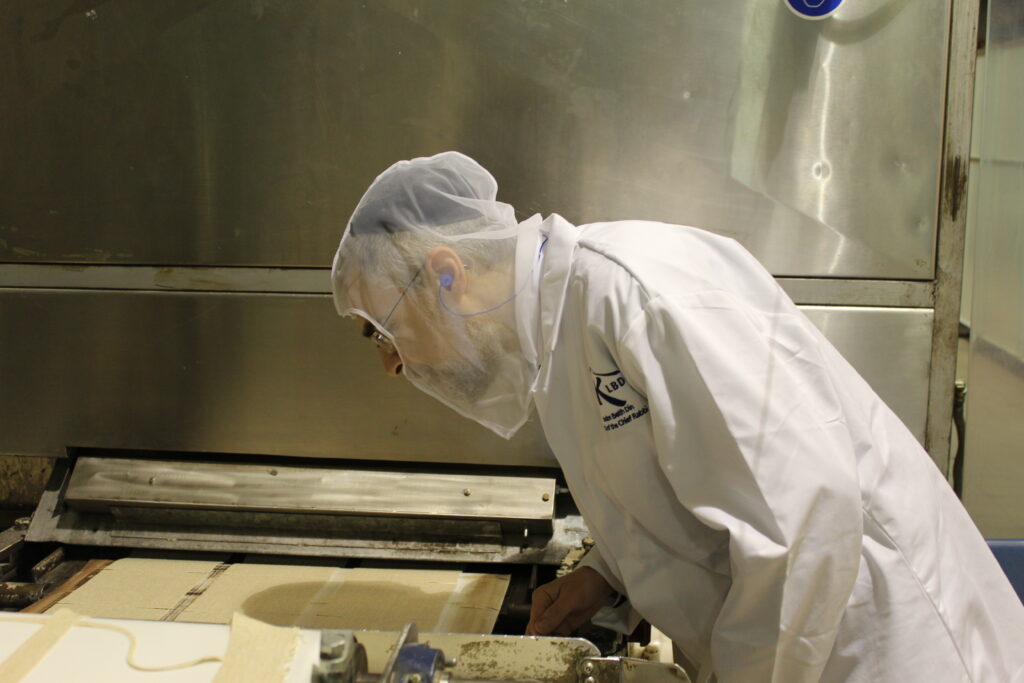LONDON — Russian’s ongoing invasion of Ukraine has led to severe shortages of matzos this Pesach, both for Jews in the country and for Jewish refugees who have fled. The Orthodox Union (OU), in coordination with the Vaad Hatzalah (VH), has been supporting communities in Ukraine and the surrounding countries. The OU contacted KLBD, the kashrus division of the London Beth Din, last week to see if they would be able to work with Rakusen’s to produce an extra run of kosher l’Pesach matzos for Ukraine. Despite having already finished their Pesach run for this year, Rakusen’s agreed to the challenge immediately.
They have been baking around the clock since Monday, with shifts running throughout the night to meet the demand. Some 70,000 boxes have been ordered, equaling nearly one million matzos. They will be distributed by the OU and VH through communities in Ukraine and Eastern Europe and through Chabad shluchim working with families in their area.
Rakusen’s staff have had to bring in huge quantities of extra flour, packaging for the boxes, as well as arrange extra staffing. The cost is being covered by the OU and VH.
The kashrus is being overseen by KLBD through Rakusen’s kashrus director, Rabbi Moshe Royde. Rabbi Royde had to hire additional mashgichim, advise the company on how to make another kosher l’Pesach run, and set new policy in order to prepare such a large batch of matzos in such a short period of time. Rakusen’s hopes to be finished by Friday morning.
Other complications the operation has faced include procuring sufficient shipping containers and arranging clearance with customs officials.
Simon Taylor, the OU’s national director, Community Projects and Partnerships, said, “The OU and VH have a call center in Vienna, Austria, where we are in regular contact with Jewish communities in Ukraine and centers in Eastern Europe. Based on the needs they were telling us, we knew we had to procure 20 tons of matzah this Pesach. We picked up the phone to KLBD in London to ask if they could help us with this project and Rakusen’s stepped up to the challenge and couldn’t have been more helpful – they closed down their factory in order to make this happen. Otherwise I simply don’t know if we would have been able to do [it] this time.”
Rakusen’s Managing Director Andrew Simpson said, “What the team in the factory have done in just a few days is frankly unbelievable. At no point did anyone in the Rakusen’s team say anything other than, ‘How can we do this?’ I’ve worked in the food industry for nearly 40 years – to put on an extra shift to work around the clock is extremely difficult, but we had no hesitation in saying yes and that’s down to the commitment and dedication of the team and KLBD. We knew that if we didn’t step up, people in Ukraine and beyond would not have matzah this year. Without my colleagues in the factory willing us to do it and finding a way to do it, it wouldn’t have happened.”
KLBD’s Rabbi Moshe Royde said, “Rakusen’s finished their main kosher l’Pesach matzah run two weeks ago, but given the huge suffering in Ukraine we knew we had to help out to ensure Jewish refugees and those still in Ukraine have matzah for Pesach. Despite the huge time pressure we have managed to achieve a very high standard of kosher l’Pesach production and, baruch Hashem, were able to recruit enough mashgichim to help us oversee the baking. We have also been able to label each box manually so it’s clear the matzah is for Jewish refugees. Getting the matzos to Ukraine quickly via Budapest has also proven challenging because owing to Brexit everything now takes longer, but thanks to the OU, VH and the Rakusen’s team we have managed to make all the necessary arrangements.”
Source: Hamodia
